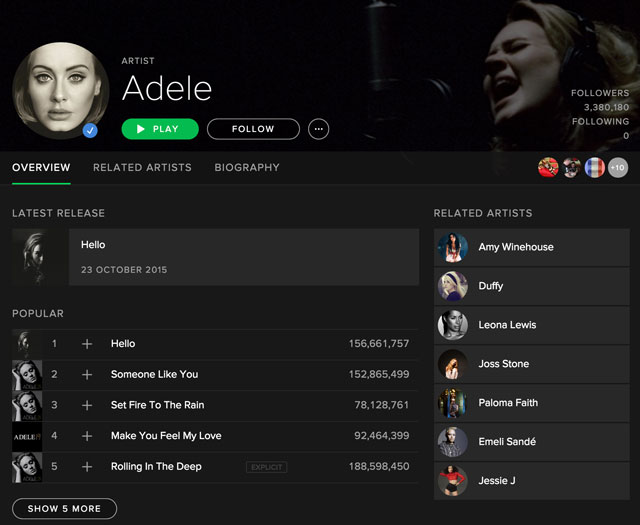

British pop sensation Adele has decided to follow in Taylor Swift’s footsteps and stop you from listening to her latest album 25 on streaming services such as Spotify and Apple Music.
While T-Swizzle eventually let Apple Music and Tidal have 1989 — after a misguided public letter — Spotify was never forgiven. And by the looks of things, Adele won’t be playing ball with any of the various streaming services currently vying for market share.
While this makes some sense in the short term, it’s still a pretty boneheaded thing to do. While music streaming is under a lot of fire from the record industry, it is the direction things are going, and there is no point in trying to stop progress. In fact, given how popular services like Spotify and Apple Music are, they aren’t just the future, they’re the present as well.
With that in mind, let’s take a look at why Adele is wrong to keep her new album 25 off of streaming services.
It’s worth noting that while Adele is in the wrong here, she’s arguably less wrong than Taylor Swift. While both share the same reasons for keeping their music off of streaming services, Swift felt the need to make a lot of silly statements about Spotify in the process. In contrast, Adele has had the good sense to keep quiet… so far.
So tell me the truth… #quote pic.twitter.com/RIfRkOZGS7
— Deezer (@Deezer) November 12, 2015
Tyler Goldman, the CEO of one of the bit players in the streaming space, Deezer, told Reuters, “[Adele’s] using this as an opportunity to try and sell more CDs or downloads.” An obvious statement, perhaps, but one which demands a closer look.
Like Swift before her, Adele is in a position to have a monster album launch. 1989 was the best selling album of 2014 and 25could take that crown this year. According to Reuters, Adele’s latest album is projected to sell at least a million units in its first week — and those are huge numbers. However, even with this short term logic, it’s a bad idea overall.
Spotify and other music services create a lot of hysteria. Jay Z went so far as to launch his own streaming service, Tidal — in an ironically tone deaf ceremony — just to compete with Spotify.
Plenty of artists complain about small royalty payments from Spotify, but as I’ve explained before, they make two fundamental errors:

This is being supported by research into the effect of streaming services. A paper from the Nation Bureau of Economic Research (NBER) found that:
Spotify use displaces permanent downloads. In particular, 137 Spotify streams appear to reduce track sales by 1 unit. Given the current industry’s revenue from track sales ($0.82 per sale) and the average payment received per stream ($0.007 per stream), our sales displacement estimates show that the losses from displaced sales are roughly outweighed by the gains in streaming revenue. In other words, our analysis shows that interactive streaming appears to be revenue-neutral for the recorded music industry.
So, regardless of the scaremongering and hand-wringing, the music industry looks to be doing just fine, thank you very much.
One thing that Spotify is killing though, is piracy. The NBER paper also found that:
Consistent with the existing literature, our analysis also shows that Spotify displaces music piracy.
I have written about this before and gone into detail on why my generation are unwilling to buy things but are prepared to pay for streaming services. It’s not clever, it’s not pretty, but if something we want to listen to isn’t available on Spotify, we’re far more likely to simply torrent it instead. That’s just how it is.
Adele’s FULL #25 album leaked — listen to it all here now https://t.co/wnPo5HywuF pic.twitter.com/spVAsFfvlh
— HollywoodLife (@HollywoodLife) November 19, 2015
And in the case of 25, it’s possible to do that before it’s even been officially released. Because, as anyone with half a brain could have predicted, 25 is now available on all the popular torrent sites.
By keeping 25 off of streaming sites, Adele is cutting off her revenue stream from people who would happily stream, might torrent, but will never buy. Essentially, she’s cutting her nose off to spite her face.
There are also other lesser reasons why Adele is wrong here.
There are people who listen to an album on Spotify and then buy those that they really love and want to keep forever. Adele has taken that option away from them, essentially demanding that they buy 25 blind, without sampling it first.
Streaming services such as Spotify and Apple Music have the capacity to pay out for many years to come, but if someone buys this album then Adele is cutting off that revenue stream forever. And if she releases her album on Spotify in a few months it will come across as cynical and gouging. Because that’s exactly what it is.
The truth is that neither Adele nor streaming services are really going to be harmed by all of this…
25 is going to be a massively successful record. Despite Taylor Swift’s ire, Spotify will continue to grow because streaming services are the future. And the record industry’s attempts to cling to the past are doomed to fail in the long term. However, right here, right now there is a short term sense to what they’re doing even if it is very annoying for fans like you and I.
What do you think of Adele’s decision to keep 25 off of streaming services? Are you going to buy Adele’s new album? Would you have liked the option of streaming it first? Will the lack of streaming make you more likely to download it illegally?
Please let us know in the comments section below!




 OTF vs. TTF Fonts: Which One Is Better?
OTF vs. TTF Fonts: Which One Is Better? Fallout 4: There's a Chem Station in Sanctuary Hills, By the Way
Fallout 4: There's a Chem Station in Sanctuary Hills, By the Way Wolfenstein: The New Order Walkthrough Guide Part 10 - Berlin Catacombs gliding for the gold snake
Wolfenstein: The New Order Walkthrough Guide Part 10 - Berlin Catacombs gliding for the gold snake Sly Cooper: Thieves in Time Wiki .
Sly Cooper: Thieves in Time Wiki . Battlefield 4 Walkthrough
Battlefield 4 Walkthrough